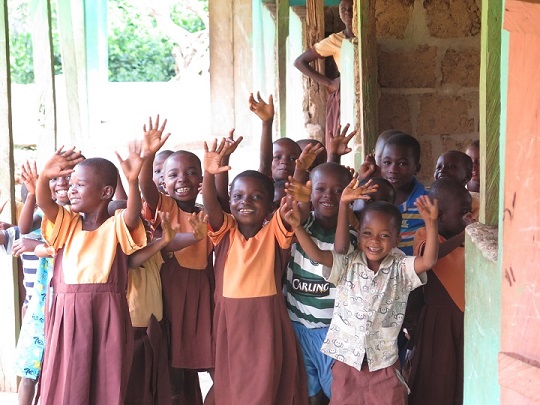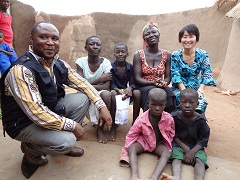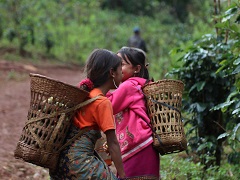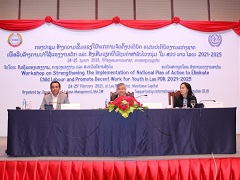June 12 is “World Day Against Child Labour”: What can we do for the future of children and the world? JICA’s challenge against child labour
2021.06.11
Child labour takes away from children’s opportunities to receive quality education and grow up safely and soundly – in other words, it is a form of labour that destroys the future of children and the world.
In 2002, the ILO launched the first World Day Against Child Labour to call upon the world to take more concerted actions to eliminate child labour. Nearly two decades have passed since then, but according to the latest data in early 2020, approximately 160 million children continue to engage in child labour. Roughly speaking, this amounts to one out of 10 children aged 5 to 17 globally, one out of 4 in Sub-Saharan Africa, where the situation is especially serious.
The data from early 2020, which represent the situation before the COVID-19 pandemic, show an upward trend from 2016. It is feared that the number of children engaging in child labour may be increasing even more because of the pandemic. Decreasing household incomes and school closures without opportunities for distance learning, among other factors, have reportedly contributed to this trend.
Until recently, JICA, while investing in interventions to address the root causes of child labour, such as education and poverty, did not necessarily have a clear focus on child labour elimination. However, the trends explained above have pushed JICA to reconsider its approach. The following are examples of new actions with a laser-beam focus on child labour elimination that JICA is taking in partnership with various partners.

Smiling children in Ghana (photo courtesy of ACE)
Chocolate is what comes to Japanese people’s minds when they hear the word “Ghana.” Actually, more than 70% of cocoa consumed in Japan is imported from Ghana.
It is reported that more than 77 million children engage in the production of cocoa, and the Government of Ghana is now implementing a policy to accredit areas with institutional setups to eliminate child labour as “child-labour free zones.”
Together with a development consulting firm, IC Net Limited, and ACE, a Japanese NGO which has for many years worked on child labour elimination, JICA is now conducting a survey to expand such child-labour free zones. The survey is supporting awareness-raising activities for residents and training of officials in cocoa-producing areas that are necessary for accreditation of child-labour free zones. Mr. Nana Brempong, the executive secretary of CRADA, a local partner NGO, is hopeful.

Mr. Brempong, the executive secretary of CRADA (left) and Ms. Shiroki, ACE Managing Director (on the right in the back row) – long-time partners fighting against child labour (photo courtesy of ACE)
“The Ghanaian Constitution guarantees the right of children to be protected from any work that threatens their development. With the support of the Japanese partners, child labour free zones will strengthen government’s and other partners’ efforts to uphold the constitutional provision of fundamental rights of children.”

Girls engaging in child labour in coffee production in Laos (photo courtesy of the ILO)
Involvement of children in employment remains common in Lao PDR. While there are many reported cases of child labour in the agriculture and hospitality sectors (restaurants, entertainment venues, etc.), the last national survey on child labour was conducted in 2010. Considering the country’s significant economic growth since then, as well as the mounting negative impacts from COVID-19, it is more important than ever for the country to grasp the actual situation of child labour.
Against this backdrop, JICA started a collaborative survey project with the ILO, a UN specialized agency with long-standing experience and top-notch technical expertise in this field, to support Lao PDR’s efforts to conduct its second national child labour survey.

Ms. Khemphone Phaokhamkeo (right), ILO Coordinator in Lao PDR, co-chairing a workshop on the implementation of the National Action Plan on Child Labour in Laos (photo courtesy of the ILO)
Ms. Khemphone Phaokhamkeo, ILO Coordinator in Lao PDR emphasizes, “This JICA-ILO supported survey will provide much needed updated data on child labour. The data will be used for policy development and programming on child labour elimination. This will support Lao PDR's progress in achieving SDGs Target 8.7.”
Lao PDR plans to disseminate the results of the survey nationwide and use it to accelerate efforts on child labour elimination. JICA will use the result to explore ways to support such efforts in the future.
It is not just Japanese NGOs and consultants or international organizations that JICA should partner with in order to make a significant contribution to elimination of child labour. Especially, the role of every company and consumer along the supply chains is essential. With this in mind, JICA established a platform with a wide array of Japanese partners for co-creating solutions on sustainable cocoa issues, including child labour in January 2021. It is JICA’s hope that more organizations and individuals will take part in this platform.
SDGs Target 8.7 calls upon the international community to eliminate child labour by 2025, and this year, the International Year for the Elimination of Child Labour, is a year for accelerating efforts. Japan’s “National Action Plan on Business and Human Rights,” published in October 2020, also call for further action in this area.
JICA will continue to explore ways to collaborate with various stakeholders to end child labour. As we welcome the World Day Against Child Labour in this International Year for the Elimination of Child Labour, we humbly invite you to consider what we can do together for the future of children and the world.
scroll